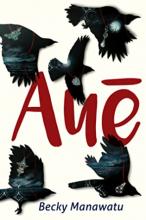Auē, Becky Manawatu
Auē: 1. (verb) (-tia) to cry, howl, groan, wail, bawl.
Nō tō mātau mōhiotanga kua mate, kāore i ārikarika te auē o ō mātau waha (HP 1991:19). / When we knew that she had died we howled our eyes out.
Understanding the meaning of the verb auē doesn't quite cover the visceral, gut-wrenching capacity of it in the way that the novel AUĒ depicts it. The characters in this novel experience it in all sorts of ways, including love, lamentation, surprise, annoyance, and sorrow.
AUĒ is on one level, a brutal novel. The subject matter is challenging, confronting and profoundly sorrowful. On another level it's hopeful, the voices that tell their stories are glorious, deeply human and cautiously optimistic. There's amazing writing here, telling difficult tales of human failure in a delicate, almost lyrical style, never downplaying the awfulness but somehow adding hope and light to some pretty dark subject matter.
To be clear, it's the darkest of dark subjects at points, with gun violence, animal cruelty, domestic violence, gang culture and drug addiction. Interwoven into those darker aspects there are insights into local belief systems and glimpses of love and the support and care of family. It also carefully explores the legacy of inter-generational trauma and learned behaviours.
The story is told from three different perspectives, Ārama (eight year old boy), Taukiri (his older brother) and a couple, Jade and Toko. The story is told in alternating viewpoints with the two boys in the present and the couple in the past. Alongside the telling of these three different perspectives are moments of description of place that are breathtakingly beautiful, but it's the internal monologues, pictures and views of the main characters that are the most descriptive, illuminating and sobering. There are also touches from another world, a view from the wind or a spirit, giving perspective and providing deeper understanding.
It's this aspect that makes AUĒ comparable to Alan Duff's ONCE WERE WARRIORS, but a completely different undertaking. They both touch on the same subject matter, the same violence, drug culture, domestic abuse and inter-generational trauma, but AUĒ, on reflection (and you'll be doing a lot of that after reading it), seemed to this reader to be like, but not the same as the other. Perhaps it's the sheer beauty of the voices of the characters here, perhaps it was the little touches of humanity - the coping mechanisms, the bandaids Ārama uses to cover up emotional and physical hurts.
Whatever it was AUĒ was gut-wrenching, uplifting, saddening to the point of tears, horrifying to the point of having to put it down, and hopeful to the point of more tears.
AUĒ has been shortlisted for the 2020 Ngaio Marsh Awards for Best and Best First Novel (eventually winning the Award for Best Crime novel).
The entire shortlist for the 2020 Ngaio Marsh Award for Best First Novel is:
Tugga's Mob, Stephen Johnson
Aue, Becky Manawatu (also shortlisted for Best Novel)
The Nancys, R.W.R. McDonald (also shortlisted for Best Novel) *
Into the Void, Christina O'Reilly
The entire shortlist for the 2020 Ngaio Marsh Award for Best Novel is:
Whatever It Takes, Paul Cleave
Girl From The Treehouse, Gudrun Frerichs
Aue, Becky Manawatu (also shortlisted for Best First Novel) *
The Nancys, R.W.R. McDonald
In The Clearing, J.P. Pomare
The Wild Card, Renee
* Category Winner
Originally published August 2020, promoted on the release of the AUS version from Scribe Publications: https://scribepublications.com.au/books-authors/books/aue-9781922585295
Taukiri was born into sorrow. Auē can be heard in the sound of the sea he loves and hates, and in the music he draws out of the guitar that was his father’s. It spills out of the gang violence that killed his father and sent his mother into hiding, and the shame he feels about abandoning his eight-year-old brother to a violent home.
But Ārama is braver than he looks, and he has a friend and his friend has a dog, and the three of them together might just be strong enough to turn back the tide of sorrow. As long as there’s aroha to give and stories to tell and a good supply of plasters.
Here is a novel that is both raw and sublime, a compelling new voice in New Zealand fiction. Haere mai, Becky Manawatu.

